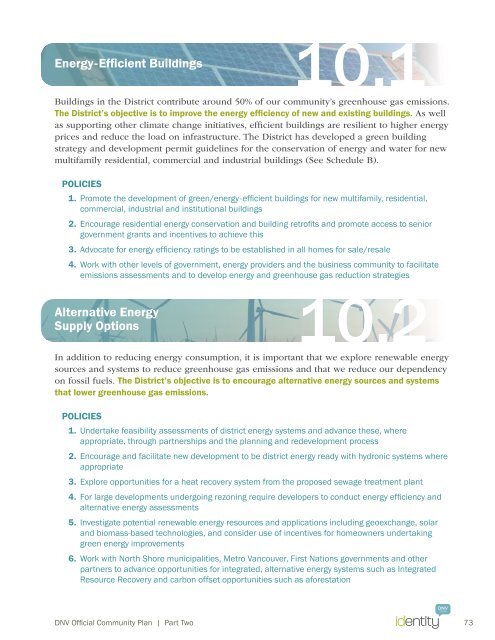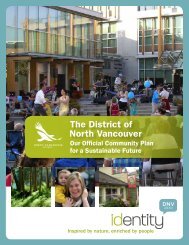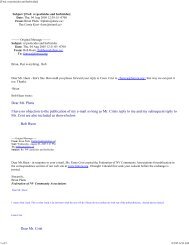Official Community Plan - District of North Vancouver
Official Community Plan - District of North Vancouver
Official Community Plan - District of North Vancouver
Create successful ePaper yourself
Turn your PDF publications into a flip-book with our unique Google optimized e-Paper software.
Energy-Efficient Buildings<br />
10.1<br />
Buildings in the <strong>District</strong> contribute around 50% <strong>of</strong> our community’s greenhouse gas emissions.<br />
The <strong>District</strong>’s objective is to improve the energy efficiency <strong>of</strong> new and existing buildings. As well<br />
as supporting other climate change initiatives, efficient buildings are resilient to higher energy<br />
prices and reduce the load on infrastructure. The <strong>District</strong> has developed a green building<br />
strategy and development permit guidelines for the conservation <strong>of</strong> energy and water for new<br />
multifamily residential, commercial and industrial buildings (See Schedule B).<br />
Policies<br />
1. Promote the development <strong>of</strong> green/energy-efficient buildings for new multifamily, residential,<br />
commercial, industrial and institutional buildings<br />
2. Encourage residential energy conservation and building retr<strong>of</strong>its and promote access to senior<br />
government grants and incentives to achieve this<br />
3. Advocate for energy efficiency ratings to be established in all homes for sale/resale<br />
4. Work with other levels <strong>of</strong> government, energy providers and the business community to facilitate<br />
emissions assessments and to develop energy and greenhouse gas reduction strategies<br />
10.2<br />
Alternative Energy<br />
Supply Options<br />
In addition to reducing energy consumption, it is important that we explore renewable energy<br />
sources and systems to reduce greenhouse gas emissions and that we reduce our dependency<br />
on fossil fuels. The <strong>District</strong>’s objective is to encourage alternative energy sources and systems<br />
that lower greenhouse gas emissions.<br />
Policies<br />
1. Undertake feasibility assessments <strong>of</strong> district energy systems and advance these, where<br />
appropriate, through partnerships and the planning and redevelopment process<br />
2. Encourage and facilitate new development to be district energy ready with hydronic systems where<br />
appropriate<br />
3. Explore opportunities for a heat recovery system from the proposed sewage treatment plant<br />
4. For large developments undergoing rezoning require developers to conduct energy efficiency and<br />
alternative energy assessments<br />
5. Investigate potential renewable energy resources and applications including geoexchange, solar<br />
and biomass-based technologies, and consider use <strong>of</strong> incentives for homeowners undertaking<br />
green energy improvements<br />
6. Work with <strong>North</strong> Shore municipalities, Metro <strong>Vancouver</strong>, First Nations governments and other<br />
partners to advance opportunities for integrated, alternative energy systems such as Integrated<br />
Resource Recovery and carbon <strong>of</strong>fset opportunities such as aforestation<br />
DNV <strong>Official</strong> <strong>Community</strong> <strong>Plan</strong> | Part Two 73




